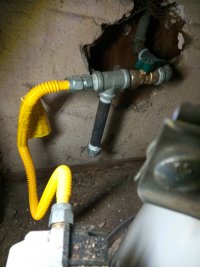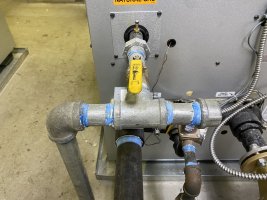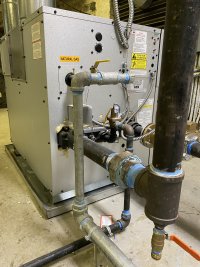-
Welcome to The Building Code Forum
Your premier resource for building code knowledge.
This forum remains free to the public thanks to the generous support of our Sawhorse Members and Corporate Sponsors. Their contributions help keep this community thriving and accessible.
Want enhanced access to expert discussions and exclusive features? Learn more about the benefits here.
Ready to upgrade? Log in and upgrade now.
You are using an out of date browser. It may not display this or other websites correctly.
You should upgrade or use an alternative browser.
You should upgrade or use an alternative browser.
IFGC SEDIMENT TRAP?
- Thread starter jar546
- Start date
jar546
CBO
Why yes it is. For fast moving gas?It’s that new style sideways trap.
I know I am getting into the personal opinion realm here, and that gas quality varies tremendously across the nation... but are sediment traps really necessary anymore? If there is sediment in the line, it most likely originates from the installation. Bulk materials can get dropped in the dirt/mud/dust, and have dust or other particulate trapped within the installed lines. Would it be therefore more practical to require that they blow-out the line prior to connecting appliances?
Sediment traps do work, but at what frequency are they necessary? Who has ever opened a sediment trap and found even the cap full, let alone the nipple?
Sediment traps do work, but at what frequency are they necessary? Who has ever opened a sediment trap and found even the cap full, let alone the nipple?
Oh, and the sediment trap is supposed to be between the appliance and the shut off valve. That way you can "empty" the trap without shutting down the whole gas distribution system.
G2419.4 (408.4) Sediment Trap
Where a sediment trap is not incorporated as part of the appliance, a sediment trap shall be installed downstream of the appliance shutoff valve as close to the inlet of the appliance as practical. The sediment trap shall be either a tee fitting having a capped nipple of any length installed vertically in the bottommost opening of the tee as illustrated in Figure G2419.4 or other device approved as an effective sediment trap. Illuminating appliances, ranges, clothes dryers, decorative vented appliances for installation in vented fireplaces, gas fireplaces and outdoor grills need not be so equipped.
steveray
SAWHORSE
We get this all the time with outdoor stuff and drip leg vs. dirt leg......
Keystone
SAWHORSE
I know I am getting into the personal opinion realm here, and that gas quality varies tremendously across the nation... but are sediment traps really necessary anymore? If there is sediment in the line, it most likely originates from the installation. Bulk materials can get dropped in the dirt/mud/dust, and have dust or other particulate trapped within the installed lines. Would it be therefore more practical to require that they blow-out the line prior to connecting appliances?
Sediment traps do work, but at what frequency are they necessary? Who has ever opened a sediment trap and found even the cap full, let alone the nipple?
I’d have doubts on all installers blowing out the line prior to service. Don’t misunderstand good installers will take the time to perform that step but others ughhhhh we know will and do not.
Is a sediment trap really needed, I think it’s like paying insurance. Useful when the unknown occurs but hopefully never needed.
north star
MODERATOR
- Joined
- Oct 19, 2009
- Messages
- 4,596
% = % = %
** classicT ** has listed the correct Code section.
"Shall be installed vertically !"
All they would have to do is to turn the
galvanized tee 90 degrees, and use the middle
opening and voila !
% = % = %
** classicT ** has listed the correct Code section.
"Shall be installed vertically !"
All they would have to do is to turn the
galvanized tee 90 degrees, and use the middle
opening and voila !
% = % = %
linnrg
Sawhorse
I stopped requiring them (but will still allow them) - discussed with the Gas company and they reported not seeing anything in the traps they took apart.
Very rare to see galvanized gas piping does that indicate that the gas is deemed corrosive? What is the blue pipe thread sealant?
Very rare to see galvanized gas piping does that indicate that the gas is deemed corrosive? What is the blue pipe thread sealant?
jar546
CBO
So you don't have a code that you follow or the code that you legally adopted does not require them?I stopped requiring them (but will still allow them) - discussed with the Gas company and they reported not seeing anything in the traps they took apart.
Very rare to see galvanized gas piping does that indicate that the gas is deemed corrosive? What is the blue pipe thread sealant?
You catch on quick. I am with linnrg. Never had any report of an issue. The gas company claims that there isn't a need. The majority of the installs are on an existing system that didn't have one or if it was there, it was useless.So you don't have a code that you follow or the code that you legally adopted does not require them?
This is from today:

Last edited:
More likely a provision of the code that they do not enforce.So you don't have a code that you follow or the code that you legally adopted does not require them?
linnrg
Sawhorse
UPC 1210.8 "For other than dry gas conditions, a drip shall be provided....
GTas company says dry
GTas company says dry
A drip tee and a sediment trap are two different things. 2018 UPC 1210.6 for drips, see 1212.9 for sediment traps which does not have the dry gas exception. Although I agree with some above statements that they may not always be necessary they are very easy to incorporate into the system and provide an extra level of protection, especially in new construction. Better to have it and not need it than to need it and not have it. A few bucks worth of fittings to protect an expensive piece of equipment is not a bad deal.UPC 1210.8 "For other than dry gas conditions, a drip shall be provided....
GTas company says dry
jar546
CBO
Doesn't matter. Submit for a code change but this creates issues when people pick and choose what they want to enforce based on their opinions. Some guy took apart some drip legs and never found a problem therefore he speaks for the entire country and all climates and installation types in varying environments? It does not work that way. Either get what you don't like out of the code legally or enforce it as written. I personally never saw a roof collapse due to lack of lateral restraints such as perpendicular ceiling joists, therefore I don't require lateral restraint on cathedral ceilings. Is this how it works?You catch on quick. I am with linnrg. Never had any report of an issue. The gas company claims that there isn't a need. The majority of the installs are on an existing system that didn't have one or if it was there, it was useless.
jar546
CBO
Correct, sediment traps don't have an exception.A drip tee and a sediment trap are two different things. 2018 UPC 1210.6 for drips, see 1212.9 for sediment traps which does not have the dry gas exception. Although I agree with some above statements that they may not always be necessary they are very easy to incorporate into the system and provide an extra level of protection, especially in new construction. Better to have it and not need it than to need it and not have it. A few bucks worth of fittings to protect an expensive piece of equipment is not a bad deal.
That's apples to kiwis. Some things just drop by the wayside. It's been ten years since I have seen a permit for a yard sprinkler system.....now I know...that's bananas to watermelons, but at least I'm still in the plumbing code and as we all know a permit is required. How about the vacuum breaker on a hose bib....never written that correction....hey now ...still in the plumbing code.I personally never saw a roof collapse due to lack of lateral restraints such as perpendicular ceiling joists, therefore I don't require lateral restraint on cathedral ceilings. Is this how it works?
As far as the rest of the country is concerned....I can count on half of one hand the Californians that pay attention to what I say much less in Topeka.
linnrg
Sawhorse
(Just to stir up some sediment here) Some of you must have that High pressure gas that is capable of blasting sediment - but me understands what those thingys at the meter are and what goes on in the gas piping system. In the OP the gas piping on the floor a couple of feet below should be checked for potential sediment!
BTW - in 2 months I won't care about sediment or drip traps
BTW - in 2 months I won't care about sediment or drip traps
Well said. Code enforcement is not about personal beliefs or opinions. Turning a blind eye because of a personal belief is pretty bad form, especially if someone is also writing corrections based on beliefs or opinions.Doesn't matter. Submit for a code change but this creates issues when people pick and choose what they want to enforce based on their opinions. Some guy took apart some drip legs and never found a problem therefore he speaks for the entire country and all climates and installation types in varying environments? It does not work that way. Either get what you don't like out of the code legally or enforce it as written. I personally never saw a roof collapse due to lack of lateral restraints such as perpendicular ceiling joists, therefore I don't require lateral restraint on cathedral ceilings. Is this how it works?
I know what opinions are like so take this with a grain of salt.
A code enforcement officer should never judge work they are seeing on anything other than code. It goes both ways, writing a correction or ignoring something based on opinion or preference. Inspectors tend to get a bad reputation and I think it jades some people on both sides of the counter. Inspectors tend to look closely at things they know about, and ignore or scoff at things they don't agree with (or don't understand). If an inspector was a plumber they will pick away at those trades but miss or ignore electrical issues and vise-versa. Ignoring things will probably never manifest issues, but it only takes one incident. Many inspectors ignore the anti-siphon hose bibs and it's probably never going to be an issue, but it only takes one hose in the wrong bucket to contaminate a water supply if the pressure drops suddenly. One in a million, or billion? Sure, but do you want your name on it if it does happen? It's like a winning the lottery or a lightning strike, chances are low, but not zero.
Everybody has to make their own choice and I only share this to encourage other inspectors to try to be less biased in their enforcement, or lack thereof.
A code enforcement officer should never judge work they are seeing on anything other than code. It goes both ways, writing a correction or ignoring something based on opinion or preference. Inspectors tend to get a bad reputation and I think it jades some people on both sides of the counter. Inspectors tend to look closely at things they know about, and ignore or scoff at things they don't agree with (or don't understand). If an inspector was a plumber they will pick away at those trades but miss or ignore electrical issues and vise-versa. Ignoring things will probably never manifest issues, but it only takes one incident. Many inspectors ignore the anti-siphon hose bibs and it's probably never going to be an issue, but it only takes one hose in the wrong bucket to contaminate a water supply if the pressure drops suddenly. One in a million, or billion? Sure, but do you want your name on it if it does happen? It's like a winning the lottery or a lightning strike, chances are low, but not zero.
Everybody has to make their own choice and I only share this to encourage other inspectors to try to be less biased in their enforcement, or lack thereof.
Congratulations ...... I can join you in six.BTW - in 2 months I won't care about sediment or drip traps
I’ve yet to meet the righteous inspector or as I like to call him, “anti-tiger”I know what opinions are like so take this with a grain of salt.
A code enforcement officer should never judge work they are seeing on anything other than code. It goes both ways, writing a correction or ignoring something based on opinion or preference. Inspectors tend to get a bad reputation and I think it jades some people on both sides of the counter. Inspectors tend to look closely at things they know about, and ignore or scoff at things they don't agree with (or don't understand). If an inspector was a plumber they will pick away at those trades but miss or ignore electrical issues and vise-versa. Ignoring things will probably never manifest issues, but it only takes one incident. Many inspectors ignore the anti-siphon hose bibs and it's probably never going to be an issue, but it only takes one hose in the wrong bucket to contaminate a water supply if the pressure drops suddenly. One in a million, or billion? Sure, but do you want your name on it if it does happen? It's like a winning the lottery or a lightning strike, chances are low, but not zero.
Everybody has to make their own choice and I only share this to encourage other inspectors to try to be less biased in their enforcement, or lack thereof.
Mr. Inspector
SAWHORSE
I see the traps missing for LP gas all the time. LP gas is exempted from the codes in PA. LP gas installers are only required to watch a 20 min. film of how to do a pressure test and then they get a certification. They don't need to know anything about plumbing or codes and there is no enforcement of the work being done by a certified person.
steveray
SAWHORSE
Hope you both stay on here! And congrats! 15 more years and I am out!......Congratulations ...... I can join you in six.


